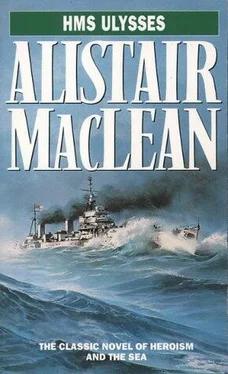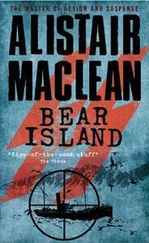"This will do me nicely, meantime, thank you," Tyndall said dryly. "For a curtain-raiser, it's doing not so badly."
It was a masterly understatement. For a curtain-raiser, it was a magnificent performance. The wind was fairly steady, about Force 9 on the Beaufort scale, and the snow had stopped. A temporary cessation only, they all knew-far ahead to the north-west the sky was a peculiarly livid colour. It was a dull glaring purple, neither increasing nor fading, faintly luminous and vaguely menacing in its uniformity and permanence. Even to men who had seen everything the Arctic skies had to offer, from pitchy darkness on a summer's noon, right through the magnificent displays of Northern Lights to that wonderfully washed-out blue that so often smiles down on the stupendous calms of the milk-white seas that lap edge of the Barrier, this was something quite unknown.
But the Admiral's reference had been to the sea. It had been building up, steadily, inexorably, all during the morning. Now, at noon, it looked uncommonly like an eighteenth-century print of a barque in a storm-serried waves of greenish-grey, straight, regular and marching uniformly along, each decoratively topped with frothing caps of white. Only I here, there were 500 feet between crest and crest, and the squadron, heading almost directly into it, was taking hearty punishment.
For the little ships, already burying their bows every fifteen seconds in a creaming smother of cascading white, this was bad enough, but another, a more dangerous and insidious enemy was at work-the cold. The temperature had long sunk below freezing point, and the mercury was still shrinking down, close towards the zero mark.
The cold was now intense: ice formed in cabins and mess decks: fresh-water systems froze solid: metal contracted, hatch covers jammed, door hinges locked in frozen immobility, the oil in the searchlight controls gummed up and made them useless. To keep a watch, especially a watch on the bridge, was torture: the first shock of that bitter wind seared the lungs, left a man fighting for breath: if he had forgotten to don gloves-first the silk gloves, then the woollen mittens, then the sheepskin gauntlets-and touched a handrail, the palms of the hands seared off, the skin burnt as by white-hot metal: on the bridge, if he forgot to duck when the bows smashed down into a trough, the flying spray, solidified in a second into hurtling slivers of ice, lanced cheek and forehead open to the bone: hands froze, the very marrow of the bones numbed, the deadly chill crept upwards from feet to calves to thighs, nose and chin turned white with frostbite and demanded immediate attention: and then, by far the worst of all, the end of the watch, the return below deck, the writhing, excruciating agony of returning circulation. But, for all this, words are useless things, pale shadows of reality. Some things lie beyond the knowledge and the experience of the majority of mankind, and here imagination finds itself in a world unknown.
But all these things were relatively trifles, personal inconveniences to be shrugged aside. The real danger lay elsewhere. It lay in the fact of ice.
There were over three hundred tons of it already on the decks of the Ulysses, and more forming every minute. It lay in a thick, even coat over the main deck, the fo'c'sle, the gun-decks and the bridges: it hung in long, jagged icicles from coamings and turrets and rails: it trebled the diameter of every wire, stay and halliard, and turned slender masts into monstrous trees, ungainly and improbable. It lay everywhere, a deadly menace, and much of the danger lay in the slippery surface it presented-a problem much more easily overcome on a coal-fired merchant ship with clinker and ashes from its boilers, than in the modern, oil-fired warships. On the Ulysses, they spread salt and sand and hoped for the best.
But the real danger of the ice lay in its weight. A ship, to use technical terms, can be either stiff or tender. If she's stiff, she has a low centre of gravity, rolls easily, but whips back quickly and is extremely stable and safe. If she's tender, with a high centre of gravity, she rolls reluctantly but comes back even more reluctantly, is unstable and unsafe. And if a ship were tender, and hundreds of tons of ice piled high on its decks, the centre of gravity rose to a dangerous height. It could rise to a fatal height...
The escort carriers and the destroyers, especially the Port-patrick, were vulnerable, terribly so. The carriers, already unstable with the great height and weight of their reinforced flight-decks, provided a huge, smooth, flat surface to the falling snow, ideal conditions for the formation of ice. Earlier on, it had been possible to keep the flight-decks relatively clear-working parties had toiled incessantly with brooms and sledges, salt and steam hoses. But the weather had deteriorated so badly now that to send out a man on that wildly pitching, staggering flight-deck, glassy and infinitely treacherous, would be to send him to his death. The Wrestler and Blue Ranger had modified heating systems under the flight-decks-modified, because, unlike the British ships, these Mississippi carriers had planked flight-decks: in such extreme conditions, they were hopelessly inefficient.
Conditions aboard the destroyers were even worse. They had to contend not only with the ice from the packed snow, but with ice from the sea itself. As regularly as clockwork, huge clouds of spray broke over the destroyers' fo'c'sles as the bows crashed solidly, shockingly into the trough and rising shoulder of the next wave: the spray froze even as it touched the deck, even before it touched the deck, piling up the solid ice, in places over a foot thick, from the stem aft beyond the breakwater. The tremendous weight of the ice was pushing the little ships down by their heads; deeper, with each successive plunge ever deeper, they Buried their noses in the sea, and each time, more and more sluggishly, more and more reluctantly, they staggered laboriously up from the depths. Like the carrier captains, the destroyer skippers could only look down from their bridges, helpless, hoping.
Two hours passed, two hours in which the temperature fell to zero, hesitated, then shrank steadily beyond it, two hours in which the barometer tumbled crazily after it. Curiously, strangely, the snow still held off, the livid sky to the northwest was as far away as ever, and the sky to the south and east had cleared completely. The squadron presented a fantastic picture now, little toy-boats of sugar-icing, dazzling white, gleaming and sparkling in the pale, winter sunshine, pitching crazily through the ever-lengthening, ever-deepening valleys of grey and green of the cold Norwegian Sea, pushing on towards that far horizon, far and weird and purply glowing, the horizon of another world. It was an incredibly lovely spectacle.
Rear-Admiral Tyndall saw nothing beautiful about it. A man who was wont to claim that he never worried, he was seriously troubled now. He was gruff, to those on the bridge, gruff to the point of discourtesy and the old geniality of the Farmer Giles of even two months ago was all but gone. Ceaselessly his gaze circled the fleet; constantly, uncomfortably, he twisted in his chair. Finally he climbed down, passed through the gate and went into the Captain's shelter.
Vallery had no light on and the shelter was in semi-darkness. He lay there on his settee, a couple of blankets thrown over him. In the half-light, his face looked ghastly, corpse-like. His right hand clutched a balled handkerchief, spotted and stained: he made no attempt to hide it. With a painful effort, and before Tyndall could stop him, he had swung his legs over the edge of the settee and pulled forward a chair. Tyndall choked off his protest, sank gracefully into the seat.
"I think your curtain's just about to go up, Dick... What on earth ever induced me to become a squadron commander?"
Читать дальше
Конец ознакомительного отрывка
Купить книгу












